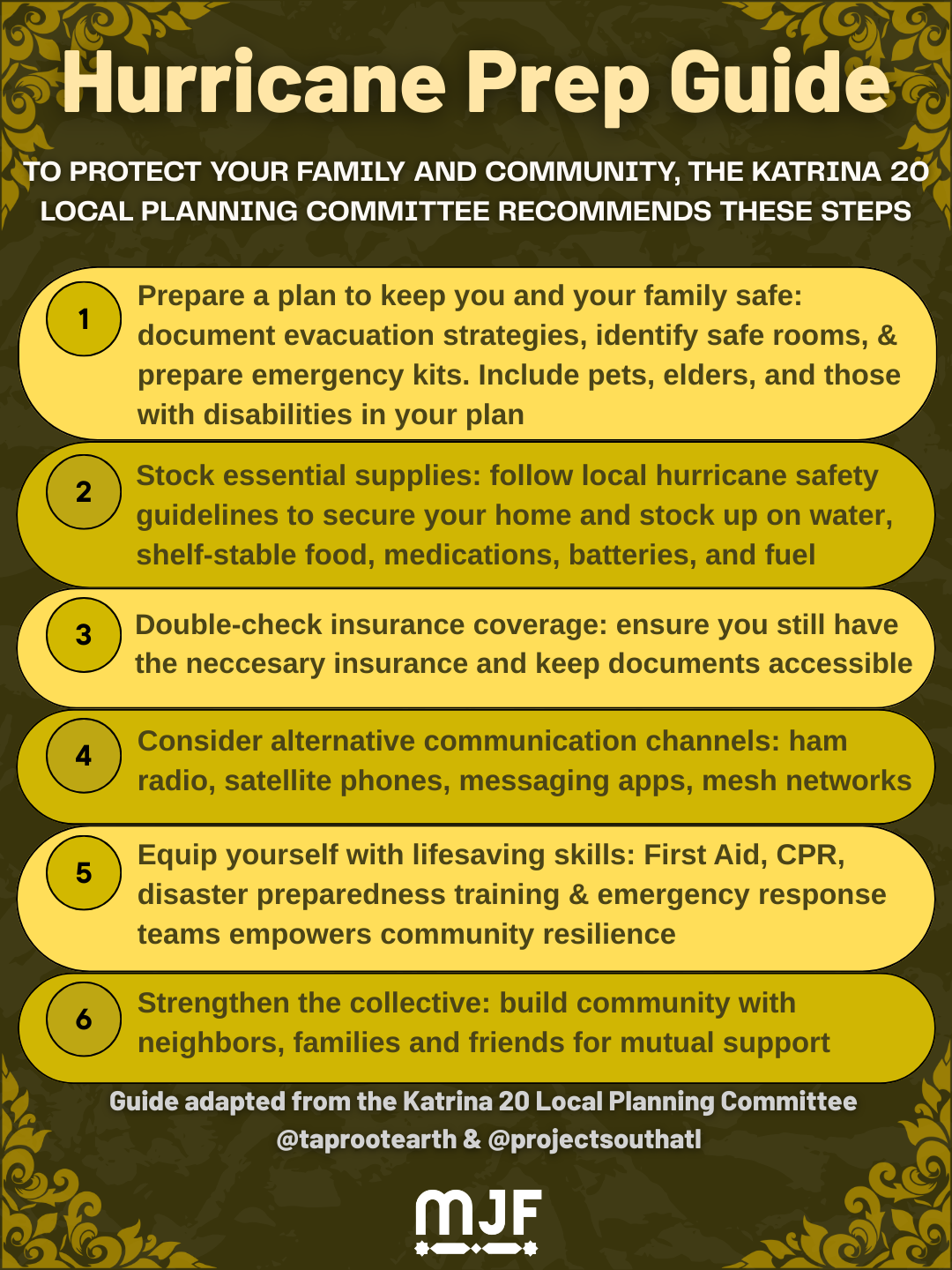Where the Levees Broke and the Bombs Fell
by MJF Senior Organizing Gulf Fellow,
Assata Dela Cruz
I was twelve years old when the War on Terror began, sitting in my seventh grade classroom having a snack as planes crashing continued to play on our little TV screen until an announcement came over the school intercom to turn it off and continue with our lessons. I didn’t fully understand what was happening… how could I really? But I could feel the shift in the air. On September 12th, I watched my sisters and aunties remove their hijabs with trembling hands and tearful eyes. At the time, I had been preparing to wear hijab myself with so much pride in stepping into a deeper expression of my faith and identity. But that excitement was replaced by fear and the sound of glass shattering as the storefront my chosen family poured their labor and love into was vandalized with Islamophobic slurs that same week. It was then that I realized not only was our family business a target, so were we. To be visibly Muslims was to be marked and not even being a child could protect me from being perceived as a threat.
In just a few days, I watched my world become one of suspicion, fear and hyper-surveillance. I saw how brown names became dangerous. I saw how I was told to use not being “visibly Muslim” to my advantage by staying silent and how other Muslim kids were taught to apologize and prove they were “good.” In classrooms and airports, our innocence was treated as a liability and our mere existence became political.
By the time I was sixteen years old, Hurricane Katrina made landfall, right here in the Gulf South, a place that the US considered disposable. This hurricane didn’t just expose cracks in infrastructure, it really shined an undeniable light on the calculated cruelty of the American state. This was a state-sanctioned failure. We watched in horror as Black elders drowned in their homes, Black mothers separated from their children, entire communities stranded on rooftops and in stadiums with no food, water or help. And in the aftermath, we were criminalized for surviving, labeled "looters" instead of refugees during this forced migration. We were treated like enemies on our own soil.
It was very apparent that the US government failed us and it wasn’t an accident. This was the War on Terror brought home. The same government that spent billions on endless wars overseas refused to protect its own citizens. Military equipment poured into Iraq and Afghanistan while the levees in New Orleans crumbled. Surveillance and policing increased in Black neighborhoods while emergency relief only came with guns and checkpoints. Our trauma was broadcasted to the world but we were left on our own. As the levees broke, so did the myth of the US’ concern.
Now in 2025 I’m still reckoning with the weight of those two formative moments: the storm and the war. One born from nature and the other from empire but both marked by abandonment, displacement and the deliberate dehumanization of Black and brown life.
Next year will mark 25 years since the US launched its so-called War on Terror. a war that reshaped not only foreign policy but the lives of people like me: Muslim, Black, Indigenous, Southern. This normalized surveillance, justified racial profiling and expanded the carceral state. It blurred the lines between national security and anti-Blackness, between foreign invasion and domestic neglect.
This year marks 20 years since Hurricane Katrina tore through the Gulf Coast and revealed to the world what Black and Indigenous communities already knew: that in the US, the storm is never just the weather.
These anniversaries are not separate because the same logic that justifies bombing villages abroad justifies abandoning Black neighborhoods at home. This same empire that invades other lands for oil and control is the one that pollutes our own waters, poisons our air and erases our history. Hurricane Katrina and the War on Terror were both about controlling who gets to live, who gets to flee and who gets left behind.
I think often about what I want my daughter to take from all this, particularly from our people's survival. I want her to know that being a Muslim and being Native to this land is not a contradiction but a sacred inheritance. I want her to know that resistance sometimes looks like staying, mothering and remembering. I want her to be proud of who she is, not just despite the world’s cruelty but because her existence testifies to the strength of all of those who came before her. I want her to understand that floods and wars will come but we are rooted deeper than either can reach.
When I look at her, I see such proof that we were never meant to be erased. I see the answer to du’as whispered on ships and screamed in storms. I see the bright future that those who abandoned us tried to drown.
The War on Terror and Hurricane Katrina both taught me how more often than not the state will turn its back on us but motherhood, faith and ancestral wisdom taught me something else: we are not powerless, we are the ones who remember and survival is only the beginning.
Read our MJF statement on Katrina here.


